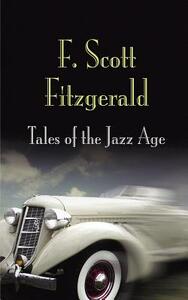Take a photo of a barcode or cover
First of all, I wanted to make something clear as mud: as cool-looking as this Penguin edition is (like every Coralie Bickford-Smith design) , it is not the actual Tales of the Jazz Age collection. The short stories comprised in this edition come both from Flappers and Philosophers and the original Tales of the Jazz Age and are (along with my rating):
1. The Curious Case of Benjamin Button (3.5/5)
2. Head and Shoulders (2.5/5)
3. The Cut-Glass Bowl (5/5)
4. The Four Fists (2/5)
5. May Day (5/5)
6. 'O Russet Witch!' (4/5)
7. Bernice Bobs Her Hair (5/5)
8. The Lees of Happiness (4.5/5)
These were all written while Fitzgerald was in his early twenties and it's so awesome that something written around a century ago feels so relevant and current. Sometimes so up-to-date that it could be an episode of the HBO show Girls.
As you can tell from the short list above, my favorites are Bernice Bobs Her Hair, The Cut-Glass Bowl and May Day. This last one is more of a novella than a short story. It is long. And at first, I would have said it was a little long-winded and slow, but it soon speeds up until the ending. And oh, what an ending. It has serious cinematic qualities. In this short story, Fitzgerald presents three different sets of characters whose storylines intertwine and contrast throughout a day and finally converge, around a great jazz party and the tragic after-party. Wonderful.
He nailed the descriptions of failing marriages (of course, his own Zelda was inspiration enough), and he described the slow change from love to tedium to hatred in swift but accurate sentences. This is a predominant theme in Head and Shoulders, The Cut-Glass Bowl and The Lees of Happiness.
But he didn't stop there, he also had a deep knowledge of friendship (real or selfish), depression, bitterness, women (specially the kind that is mean and artful, as in Bernice Bobs Her Hair) and the most impressive one, the lies we sometimes tell to ourselves to keep on living. He saw right through the excesses of the Jazz Age, he saw that desperate need for constant flare and also what comes after. This doesn't mean it's a depressing collection. It's full of humorous fragments! And also beautiful prose. I have wondered how more awesome these stories would have been if Fitzgerald didn't have to "whore" them, as he said. Which is, of course, to shape them for the public so as to be published and get some money.
1. The Curious Case of Benjamin Button (3.5/5)
2. Head and Shoulders (2.5/5)
3. The Cut-Glass Bowl (5/5)
4. The Four Fists (2/5)
5. May Day (5/5)
6. 'O Russet Witch!' (4/5)
7. Bernice Bobs Her Hair (5/5)
8. The Lees of Happiness (4.5/5)
These were all written while Fitzgerald was in his early twenties and it's so awesome that something written around a century ago feels so relevant and current. Sometimes so up-to-date that it could be an episode of the HBO show Girls.
As you can tell from the short list above, my favorites are Bernice Bobs Her Hair, The Cut-Glass Bowl and May Day. This last one is more of a novella than a short story. It is long. And at first, I would have said it was a little long-winded and slow, but it soon speeds up until the ending. And oh, what an ending. It has serious cinematic qualities. In this short story, Fitzgerald presents three different sets of characters whose storylines intertwine and contrast throughout a day and finally converge, around a great jazz party and the tragic after-party. Wonderful.
He nailed the descriptions of failing marriages (of course, his own Zelda was inspiration enough), and he described the slow change from love to tedium to hatred in swift but accurate sentences. This is a predominant theme in Head and Shoulders, The Cut-Glass Bowl and The Lees of Happiness.
But he didn't stop there, he also had a deep knowledge of friendship (real or selfish), depression, bitterness, women (specially the kind that is mean and artful, as in Bernice Bobs Her Hair) and the most impressive one, the lies we sometimes tell to ourselves to keep on living. He saw right through the excesses of the Jazz Age, he saw that desperate need for constant flare and also what comes after. This doesn't mean it's a depressing collection. It's full of humorous fragments! And also beautiful prose. I have wondered how more awesome these stories would have been if Fitzgerald didn't have to "whore" them, as he said. Which is, of course, to shape them for the public so as to be published and get some money.
I read this collection solely for "Diamond as Big as the Ritz", which is one of my fave short stories. The last two in this collection are why too jumpy and unsure, but besides that, the stories are all pretty dang solid. Oh Fitzgerald.

